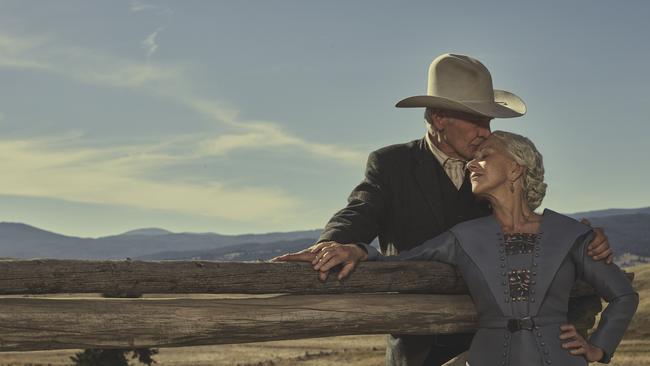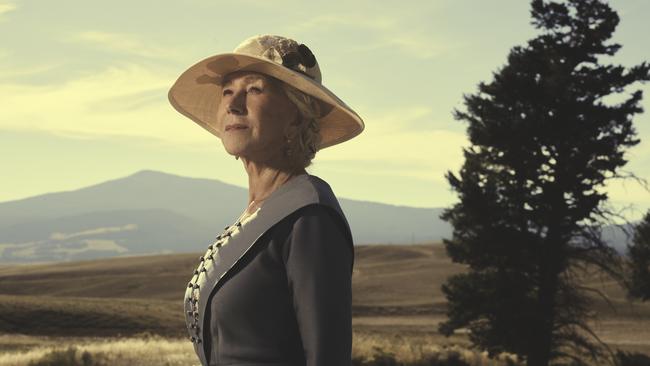1923: prequel to Yellowstone set to become a TV mega hit
1923 is the latest in the Yellowstone franchise, Harrison Ford and Helen Mirren attempting to maintain their frontier Montana’s clan power and wealth amid a locust plague and drought.

Taylor Sheridan’s not exactly a big name around local media circles for some reason but he’s currently one of TV’s big shots, the Academy Award-nominated screenwriter of the 2016 neo-western Hell or High Water and the co-creator, with John Linson, of the hit Paramount series Yellowstone.
He also wrote the cult classic cartel thriller Sicario, which Variety lauded as, “a blisteringly intense drug-trade thriller that combines expert action and suspense with another uneasy inquiry into the emotional consequences of violence.” And also in 2017 he wrote and directed Wind River, a thriller that’s centred on violence against Native American women on a reservation in Wyoming, which he says represent the way so little has changed since the American west was settled, “our country’s greatest shame.”
But Yellowstone, a monster hit on US cable TV and now streaming worldwide on Paramount, has been his great achievement, even if largely wanting for positive critical attention in the US, the series largely disdained, certainly in its early days.
As has been Sheridan, the popular impact of his now many shows, his resolute gist and implacable self-belief, and his tough guy authenticity, have been his overwhelming problem. He just doesn’t care what they, progressives really, make of him. He unapologetically says about Yellowstone that he loves, “the way that it flows from being campy to melodramatic to intensely dramatic to violent; it’s every old Western and new Western and soap opera thrown together in a blender. And, yes, I think it infuriates and confounds some people who study storytelling”.

And it is an epic contemporary western about a group of self-made pioneers called the Duttons on the edge of an Edenic wilderness set on their massive ranch, backdropped by the razored peaks of Montana’s Bitterroot Valley, bordering the famous national park. (Sheridan describes the show as “The Great Gatsby on the largest ranch in Montana.”)
Yellowstone emphasises the theme of regeneration through the challenge of nature, using the spectacular forms of the landscape to create a symbolic background to the drama. The series follows Kevin Costner’s aging Montana rancher John Dutton – and good he is, too – as he fights off land grabbers, corporations and slimy Silicon Valley investors eager to destroy his family’s way of life. He’s fiercely entangled with issues surrounding land management, rural-urban tensions, and the relationship between big government and local stakeholders.
Then there is the local Native American tribe, whose borders with the predominantly-white ranch causes no end of abrasion, living with enduring poverty, suicide and addiction. They’re a constant threat to Dutton, the elders not above thoughts of violent land grabs, but they’re cleverer and more devious than that, of course.
Many critics generally loathed Yellowstone at the start and its vision of white American masculinity, that idea of aggrieved entitlement, the sense that the benefits to which white men long believed themselves entitled are being snatched from them. Dutton sees himself battling the shallow prejudices of an over refined and effete society that to his eyes has lost contact with its most significant values.
But while he will do anything to keep his property, his life meaningless without it, deep inside he accepts his is the last generation that will keep it. It gives the show its elegiac quality, adding a lovely layer to the melodrama, violence, shootouts, family shenanigans, fistfights, scenic roundups and Sheridan’s quirky gift for dialogue.
What Sheridan gets onto is that traditional idea of American individualism, valuing the individual’s interest over the demands of groups, authorities, and custom. It’s a notion that’s such a feature of the classic western, exploring such value conflicts as between traditional ways of life and progress, violence and legal process, masculinity and love of country. He created the hugely successful prequel, 1883, which celebrates the origin tale of the Dutton family, following their 19th-century ancestors James and Margaret as they embark on their wild journey from Texas to Montana through the Great Plains. Looking for a fresh start, they’re leading a wagon train of German immigrants wholly unprepared for the rigors and severities of the west, its outlaws, barbarous Indians waging righteous war, chasing scalps, and the bitter weather. Brilliant and deeply affecting it is, too.
James and Margaret Dutton are played with wonderful authenticity by real-life couple Tim McGraw and Faith Hill, and Sam Elliot – with that familiar drooping moustache and doom-laden voice – is cowboy scout Shea Brennan. He’s like a character from Mark Twain’s Roughing It, his semi-autobiographical work about the American west in the 1860s, “this bloody, desperate, kindly-mannered urbane gentleman who never hesitated to warn his most ruffianly enemies that he would kill them whenever or wherever he came across them next.”
A wonderful creation in an absorbing series that manipulates the western formula so that it responds to those not necessarily enamoured of horses, cattle and guns.
1923 is the latest in the Yellowstone franchise, Harrison Ford and Helen Mirren attempting to maintain their frontier Montana’s clan power and wealth as a locust plague and drought threaten to destroy their pasture, and subsequently their cattle.
Ford is Jacob Dutton, the brother of 1883’s James Dutton and the great-grand uncle of Yellowstone’s John Dutton, though to become involved in 1928 doesn’t really require close understanding of the lineage. Dutton is a man carrying an overbearing sense of self, a just understated tyrannical authority and a ruthless appeal to violence that makes him a great hero, fighting not for advantage but for the purity of his own image. He is a man who asserts his authority in action, creating his own methods of insuring order and achieving justice. Like all the Duttons he will not allow the will of his cowboy community to be distorted by easily corrupted institutional machinery.
He’s got a lot to cope with – a group of Irish shepherds, led by militant Banner Creighton (Jerome Flynn), are also in trouble with conditions as they try to take their sheep to pasture and have trespassed into other men’s lands to let their animals feed. Dutton somehow has to find a way to avoid a range war, the shepherds carrying the strict belief that their necessity overrides any pastoral law. Electricity is coming, too, and a hoard of temperance movement women is on the loose attacking bars and pharmacies.
Cara Dutton, played with ferocious energy by Mirren, is the matriarch of the operation. She is not afraid of dispensing a piece of frontier justice in her own right, and is handy with a shotgun. She knows her place, too, for all her stubborn stoicism. “You have to want the life,” she tells her about-to-be daughter-in-law. “Because in this life there’s no debating who is more important – the women or the cattle. It’s always the cattle.”
One of a number of parallel plots, featuring an intriguing Hemingway-esque theme, involves long-lost son Spencer (Brandon Sklenar), a traumatised WWI hero turned game hunter, chasing “a leopard the size of a sofa”, terrorising a bush camp of high-society travellers. He’s a mystery man of no destination, he says, “just next stops.”
In the other major storyline, as yet unconnected, we meet Teonna Rainwater (Aminah Nieves,) a young native woman forcibly interned at a federal Indigenous boarding school. In a series of horrifying scenes, she’s verbally and physically abused, first by a nun, Sister Alice (Kerry O’ Malley), then by a priest, Father Renaud (Sebastian Roche.) It’s an unexpected and lacerating introduction to the US government’s mission at the time to restructure Indians’ minds and personalities by severing children’s physical, cultural, and spiritual connections to their tribes.
As always Sheridan’s vision is that of a fantasy reflecting a profound disbelief in the modern agencies of law and justice to serve their righteous function.
It will be fascinating as this series develops to see how Sheridan enmeshes this into his central theme of the progress towards civilisation and order, the way the old life and the new are in constant confrontation, and individual actions may shift the balance one way or another.
Ben Richardson, an old Yellowstone hand, who also worked with Taylor on Wild River, directs and shares director of photography credit with Corrin Hodgson, with a lovely visual style, an immersive sense of the landscape and the energy within the frame. He’s good at intercutting subjective close-ups into the action, getting the idea of what it’s like to be in close proximity to his charactersas if we are part of their conversations.
There are many ideas, themes and storylines, piling up quickly and not always convincingly integrated. It hardly matters at this stage, the whole shebang is wonderfully cinematic and romantically entertaining. The episode finishes with two explosive cliff-hangers, Sheridan delighting in surprises and confronting moments that shock and confound us.
1923 streaming on Paramount Plus


To join the conversation, please log in. Don't have an account? Register
Join the conversation, you are commenting as Logout